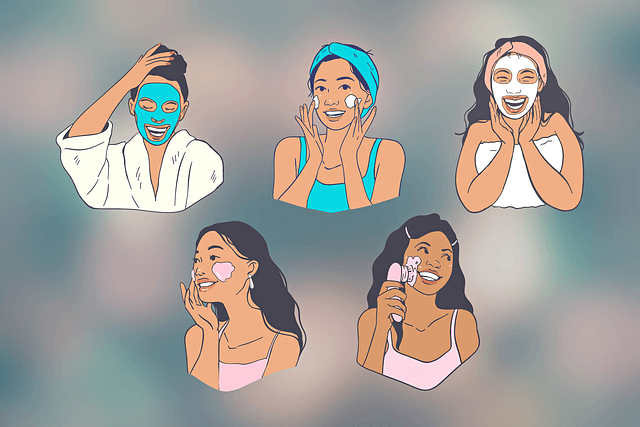
Best Skincare Routine Tips by Dermatologists.
Share

You want to start taking good care of your skin, but you have some questions:
- How many different things do you need to use to keep your skin healthy?
- Which skin products make your skin feel good?
- How to use these skin care products?
- And what do the items actually do?
We find out the best ways to start and what to remember as you put together the best routine for your skin.
Wash your face
Always rinse your face with water in the morning and at night, then rub a small amount of gentle cleanser between your clean palms. Use light pressure to rub face wash all over your face. Rinse your hands and massage your face with water until all the cleanser and dirt are gone. Use a soft towel to pat your face dry. If you wear makeup, you might need to wash your face twice before bed. First, wash your face with micellar water or cleansing oil. Try leaving eye-makeup removers on for a few minutes to make it easier to remove the makeup and keep you from rubbing your eyes. After that, gently wash your whole face.
Apply toner
If you use a toner, you should put it on after you wash your face but before you do anything else. Put a few drops of toner or cotton pad on your hands, then gently wipe your face with them. If your toner has ingredients like glycolic acid that help remove dead skin cells, you should only use it at night. Formulas that keep the skin moist can be used twice a day. Don't use retinoids or other exfoliators along with a toner that scrubs your skin.
Apply serum
Morning is a great time to use a serum with antioxidants, like a brightening vitamin C serum, because they protect your skin from free radicals you'll encounter throughout the day. Nighttime is an excellent time to moisturize your skin with a hyaluronic acid serum, which keeps your skin from drying out at night. It is even more critical, especially if you're using anti-aging or acne treatments that can irritate and dry out the skin. Serums can also contain exfoliants such as alpha-hydroxy acids (AHA) or lactic acid. Always remember whatever you're using, water-based serums should go underneath moisturizer; oil-based serums should be applied after moisturizer.
Apply eye cream
You can put regular moisturizer under your eyes. Still, if you use an eye cream, you should usually put it on top of moisturizer because eye creams tend to be thinner than moisturizers for the face. If your eyes show early morning puffiness, use an eye cream with a metal roller-ball applicator and keep it in the fridge. Putting on a moisturizing eye cream at night can make your eyes look puffy when you wake up.
Use spot treatment
It's best to use spot treatments for acne at night when your body is repairing itself. Be careful about putting benzoyl peroxide or salicylic acid on top of retinol, which can cause irritation. Instead, try to keep your skin as calm and hydrated as possible.
Moisturize
A moisturizer keeps your skin hydrated and all the other products you've put in place. Look for a light lotion with an SPF of 30 or more for the morning. You can use a thicker night cream at night. If your skin is dry, you might want to use a cream in the morning and at night.
Apply retinoid
By speeding up the turnover of skin cells, retinoids like retinol can help eliminate dark spots, pimples, and fine lines. Still, they can also be irritating, especially for people with sensitive skin. Know that retinoids break down in the sun, so you should only use them at night. Also, they make your skin more sensitive to the sun, so you must wear sunscreen.
Apply face oil
Hempseed Oil, Argan oil, Almond Oil, Avocado Oil, Grape seed oil are some very useful oils that nourish the skin. If you use a face oil, put it on after your other skin care products since nothing else can get through the oil.
Apply sunscreen
Sun protection may be the last step, but almost every dermatologist will tell you it is the most important. Skin cancer and signs of aging can be avoided by keeping your skin safe from UV rays. Even if your moisturizer doesn't have SPF, you should still wear sunscreen. For chemical sunscreens to work, you need to wait 20 minutes after putting them on before going outside. Look for sunscreen with a broad-spectrum SPF. This means that it protects against both UVA and UVB rays.
Very Important Tip:- "Some concerns live deeper than the skin. Visibly puffy eyes, dehydrated skin, age spots, pigmentation, or de-pigmentations could indicate an underlying health concern such as liver, kidney, hormones, blood sugar, or immunity imbalance. If you have any skin concerns or doubts, it is always better to visit a specialist," says Dr. H.S Chauhan. Dermatologist Medical Director, Twacha Dermatology Clinics India



